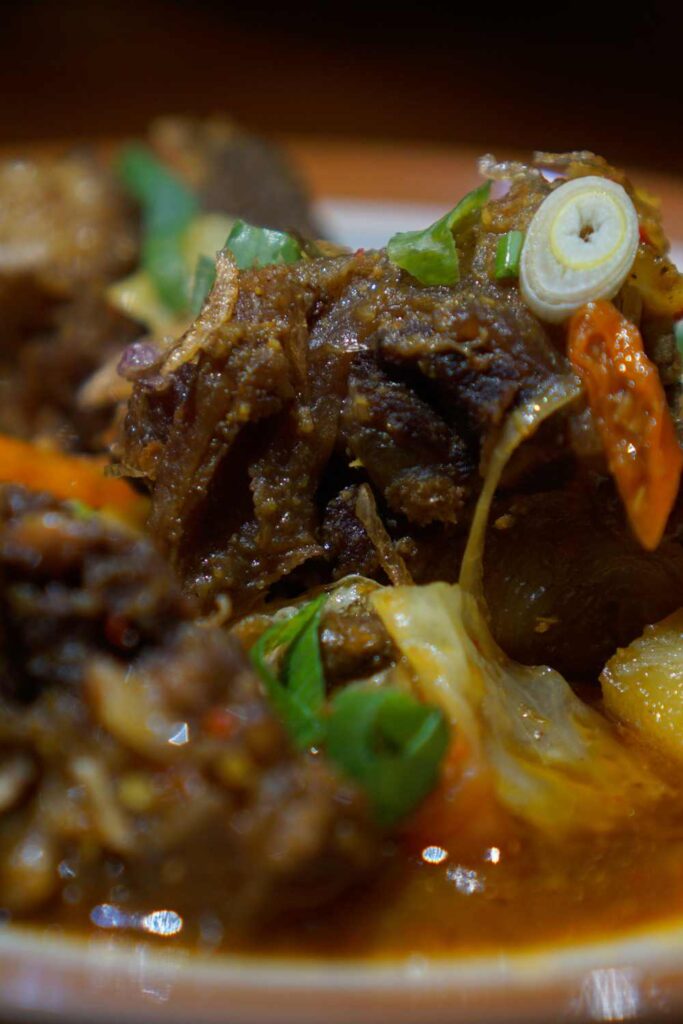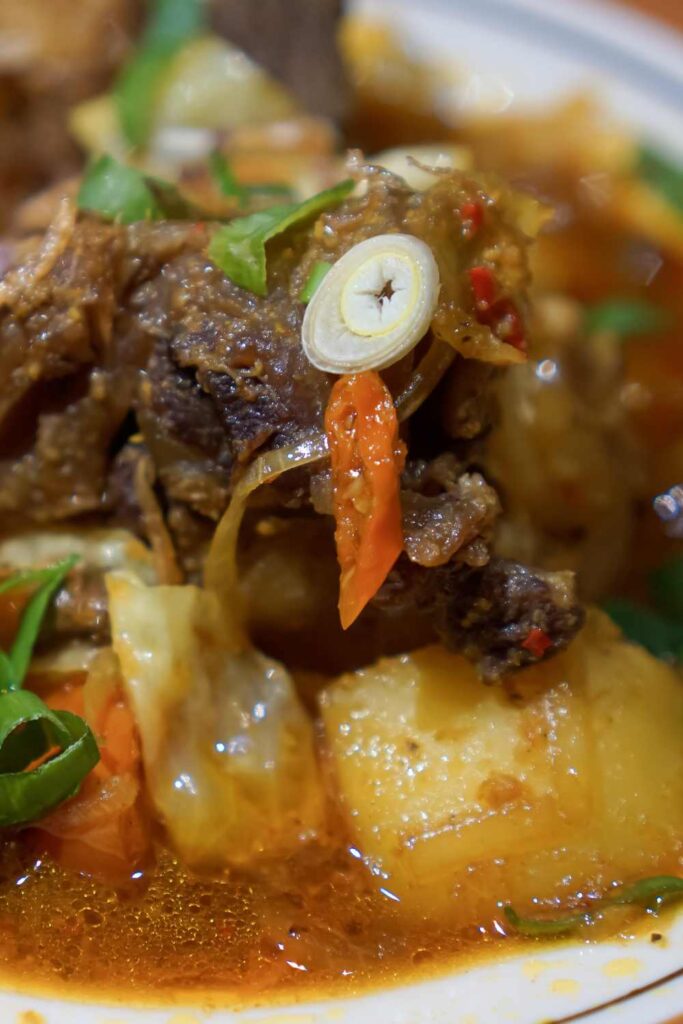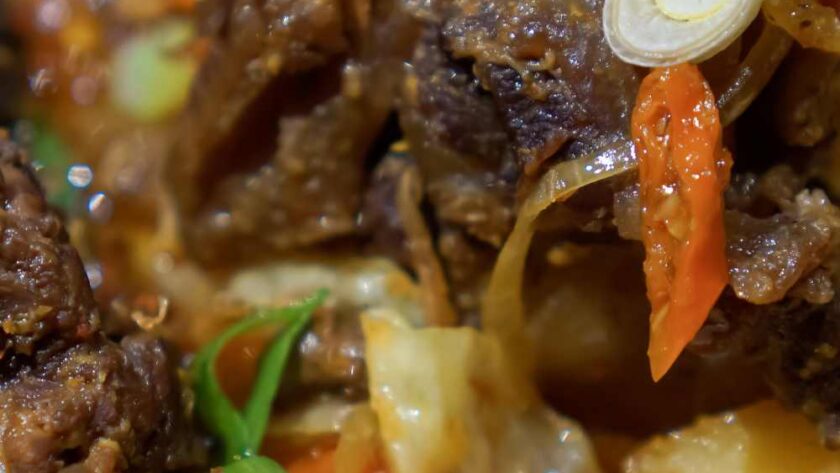This Pioneer Woman Prime Rib Soup recipe is made with beef ribs, beef stock, potato, mushrooms, salt, pepper, and fresh chives. It takes 255 minutes to prepare and serves 4.
Try More Pioneer Woman Recipe:
- Pioneer Woman Beef And Barley Soup
- Pioneer woman Homemade Cream Of Chicken Soup
- Pioneer Woman Bacon Jam Recipe
🧡 Why You’ll Love This Prime Rib Soup Recipe:
- Rich Flavor: The beef ribs and stock create a deep, savory base, enhanced by the earthy mushrooms and aromatic chives.
- Comfort in a Bowl: With tender meat and hearty potatoes, this soup is the perfect warm, comforting meal for chilly evenings.
- Easy Preparation: Simple ingredients and straightforward instructions make this recipe accessible to cooks of all skill levels.
- Versatility: Serve as a standalone meal or pair with crusty bread for a satisfying lunch or dinner option.
- Leftover Revival: Transform leftover prime rib into a delicious new dish, reducing waste and maximizing flavor.
❓ What Is Pioneer Woman Prime Rib Soup Recipe?
Pioneer Woman Prime Rib Soup is a hearty dish made with beef ribs, stock, potatoes, mushrooms, and chives. It’s rich and flavorful with tender meat and savory broth, perfect for cold nights. Its name reflects its roots in traditional American cooking, evoking images of frontier meals.

🥩 Pioneer Woman Prime Rib Soup Ingredients:
- 4 beef ribs, trimmed from a cooked prime rib roast
- 2 cups beef stock
- 1 potato, peeled and cut into 3/4 inch pieces
- 1 (8 ounce) package sliced fresh mushrooms
- 1 teaspoon salt
- 1 teaspoon black pepper
- ¼ cup chopped fresh chives
🍲 How To Make Pioneer Woman Prime Rib Soup
- Gather everything you need.
- Put the ribs in a big pot and add enough water to cover them. Bring to a boil, then lower the heat to medium-low, cover, and let it cook for about two hours, or until the meat falls off the bones.
- Take the ribs out and let them cool down. Cut the ribs’ meat into bite-sized pieces and put them in the fridge.
- Keep simmering the soup until it’s down to one cup. Put it in the fridge until the fat solidifies on top.
- Remove and throw away any solidified fat.
- Add pork scraps, beef stock, potatoes, mushrooms, salt, and pepper to the broth in a saucepan. Bring to a boil, then lower the heat to medium-low, cover, and let it cook for about 20 minutes, or until the potatoes are soft. Add chives right before serving.
💭 Recipe Tips:
- Use beef ribs with ample meat for richer flavor and texture.
- Adjust salt carefully; the prime rib may already be seasoned.
- Don’t overcook potatoes; aim for tender but not mushy.
- Experiment with different herbs like thyme or rosemary for added depth.
- Control thickness by adjusting stock amount; too much can dilute flavors.

🥗 What To Serve With Prime Rib Soup?
Crusty bread or garlic bread complements the soup’s rich flavors a simple green salad adds freshness, while roasted vegetables offer a hearty side dish.
🎚 How To Store Leftovers Prime Rib Soup?
- Refrigerator: To store Leftovers Prime Rib Soup let it cool to room temperature, then refrigerate in an airtight container for up to 3-4 days.
- Freezer: For freezing portion cooled Leftovers Prime Rib Soup into freezer-safe containers leaving room for expansion and freeze for up to 3 months.
🥵 How To Reheat Leftovers Prime Rib Soup?
- In The Stovetop: Heat Leftovers Prime Rib Soup over medium stirring occasionally until simmering about 5-10 minutes.
- In The Microwave: Heat Leftovers Prime Rib Soup for 1-2 minutes stir it then continue in 30-second intervals until warm.
FAQ’S
Can you use leftover prime rib to make prime rib soup?
Yes, you can use leftover prime rib to make prime rib soup. Simply shred or chop the leftover meat and add it to the soup during the cooking process for added flavor and texture.
How can I make prime rib soup in a slow cooker?
To make prime rib soup in a slow cooker, combine beef ribs, stock, vegetables, and seasonings in the slow cooker. Cook on low for 8-10 hours or on high for 4-6 hours until the meat is tender and flavors meld together.
How can I thicken prime rib soup if it’s too thin?
To thicken prime rib soup, create a slurry by mixing equal parts cornstarch and cold water. Stir the slurry into the soup and simmer until desired thickness is reached.
How do you know when the prime rib soup is fully cooked?
Prime rib soup is fully cooked when the beef ribs are tender and easily fall off the bone. Additionally, the vegetables should be soft, and the flavors well melded. Taste testing for seasoning can also help determine readiness.
Try More Pioneer Woman Recipe:
Pioneer Woman Prime Rib Soup Nutrition Facts
Servings Per Recipe 4
- Calories 197
- Total Fat 9g
- Saturated Fat 4g
- Cholesterol 41mg
- Sodium 655mg
- Total Carbohydrate 12g
- Dietary Fiber 2g
- Total Sugars 3g
- Protein 18g
- Vitamin C 15mg
- Calcium 22mg
- Iron 2mg
- Potassium 542mg
Pioneer Woman Prime Rib Soup
Description
This Pioneer Woman Prime Rib Soup recipe is made with beef ribs, beef stock, potato, mushrooms, salt, pepper, and fresh chives. It takes 255 minutes to prepare and serves 4.
Ingredients
Instructions
- Gather everything you need.
- Put the ribs in a big pot and add enough water to cover them. Bring to a boil, then lower the heat to medium-low, cover, and let it cook for about two hours, or until the meat falls off the bones.
- Take the ribs out and let them cool down. Cut the ribs’ meat into bite-sized pieces and put them in the fridge.
- Keep simmering the soup until it’s down to one cup. Put it in the fridge until the fat solidifies on top.
- Remove and throw away any solidified fat.
- Add pork scraps, beef stock, potatoes, mushrooms, salt, and pepper to the broth in a saucepan. Bring to a boil, then lower the heat to medium-low, cover, and let it cook for about 20 minutes, or until the potatoes are soft. Add chives right before serving.
Notes
- Use beef ribs with ample meat for richer flavor and texture.
Adjust salt carefully; the prime rib may already be seasoned.
Don’t overcook potatoes; aim for tender but not mushy.
Experiment with different herbs like thyme or rosemary for added depth.
Control thickness by adjusting stock amount; too much can dilute flavors.
